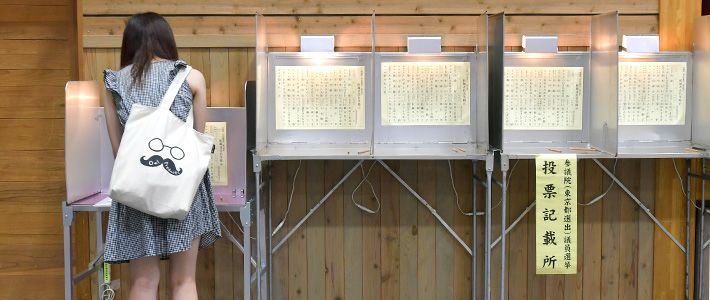Well, first off 'vote is not mandatory' is hardly a thing to slam a democractic country for. Fact of the matter is, most of democratic states in the world do not employ compulsory voting. Wikipedia claims only 22 country as of 2013 provide compulsory voting (
Compulsory voting - Wikipedia). I don't count, but if you look at CIA factbooks the relative low of compulsory vote checks out
https://www.cia.gov/library/publications/resources/the-world-factbook/fields/print_2123.html. Easiest example is probably USA, who does not use it. My country (Indonesia) does not use it, and yet voter turnout still reasonably high (81% in last year presidential election, rising from 69% in the previous presidential election,
Elections in Indonesia - Wikipedia) . Arguments can be made on the benefit of compusory voting, but it stands to reason that 1) lack of compulsory voting does not a make a state especially bad among all other democracies 2) while compulsory voting may help, lack of it does not necessarily hamper getting decent voter turnout or citizen involvement in politics.
Next, average age of voters.
Noticeable in recent elections is the sluggish turnout among young voters. According to a sample survey, only 31.33 percent of eligible voters age 18 and 19 went to the polling stations in Sunday's election — 17 points lower than the all-generation average and a decline of 15 points from 2016.
Turnout among the 18- and 19-year-olds in Diet elections has continued to fall since they were given the right to vote — from 46.7 percent in 2016 to 40.49 percent in the Lower House race in 2017. The turnout was even lower among 19-year-olds at 28.05 percent. The problem is attributed to the presence of many youths who after graduating from high school leave their hometowns to continue their education or find jobs without transferring their resident registry, depriving themselves of the right to vote in their current place of residence.
Both the campaign for the Upper House election and its outcome need to be reviewed to learn what can be done to increase voter participation in future elections.

www.japantimes.co.jp
Under a revision of the Public Offices Election Act that came into effect in June 2016, the
voting age in Japan was lowered from 20 to 18. Due to the combination of a low birthrate and longer lifespans, senior citizens (age 65 or over) now account for a quarter of Japan's population. And older people are more likely to vote than young people: In the most recent election for the House of Representatives (the lower house of the National Diet) in 2014, for example, 68% of citizens in their sixties went to the polls, but only 32% of those in their twenties turned out. This combination of factors has led some people to complain that Japan has a "silver democracy"—a system in which silver-haired seniors hold the upper hand and young people's wills tend to be neglected.
This July, in the first national election since the lowering of the voting age, young people seemed to endorse the status quo. But voting is not the only form of political activity. Adult voters should reconsider their own approach to politics.

www.nippon.com
So it does seem bear out that there's lower interest to vote among the younger batch of Japan's eligible voters (though if you read the second article in full it notes that the goverment is aware of the problem and try to encourage youths to participate). Question though, how about in other countries? Well, it seems historically US youth tend to have lower turnout that it more aged population
Youth vote in the United States - Wikipedia
Same trend can be observed in Canada:
Voter Turnout by Age Group - Elections Canada
There's also this.
How do you solve Britain's youth voting crisis?
I haven't managed to find a global statistics of voter turnout by age in my brief googling, but it seems reasonable at this point to say that 'lower voter turnout among youths' is a trend that happens in multiple countries. With my only brief research I also cannot say, whether Japan has this issue how much worse or less than other countries. The cited number for youth turnout from source above seems higher for USA and Canada, but the guardian cited lower percentage of voter turnout for 18-24. They are also only three countries besides.
Moving on to the average age of politicians. For this point, I fortunately easily arrived at high quality source. Straight from United Nations Development Programme, The Global Parlimentary report contains a statistics of average age
The Global Parliamentary Report | UNDP
Unfortunately, their statistics is region-based, instead of country-based. But at least we got image of average distribution of parliements age around the world
Which all have its median located in the 50-60 range. There's some variation in over-60 ranges VS under-50 ranges, but otherwise there's close resemblance between each graphic. Statement such as 'most politicians aged above 40' as it turns out is a truism that apply to whole world.
For closer look, the age of demograhpy of US Congress:
How Old is Congress?
Japan's:
Japan
See resemblance?



